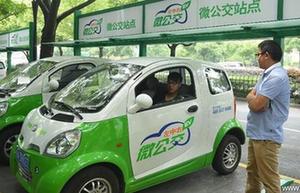Car sharing on the road to China
By Li Fangfang (China Daily) Updated: 2014-06-09 07:13'car2share'
German vehicle provider Daimler AG was the first automaker to offer a commercialized corporate car-sharing program in China, after it started its car2share program in Shenzhen in February. The concept was the Chinese version of Daimler's successful car2go project, which runs in 25 cities in Europe and North America and offers one-way point-to-point rentals.
Daimler's initial trial phase in China offered a fleet of 30 smart Fortwo cars to 10,000 employees at Tencent Holdings, one of the nation's leading Internet companies, for both business and private trips.
After email registration car2share members could book vehicles online, pick up the car at Tencent's parking lot and drive away.
Payment was charged by the minute, with discounted fixed rates for hourly and daily use, and completed on return using Wechat Pay by scanning a uniquely generated quick-response code.
In the future, Daimler plans to expand the program to other cities with various car models."A forward-looking concept, our car2share pilot project provides a flexible, convenient and environmentally friendly approach to urban mobility in China," said Hubertus Troska, Daimler's management board member and chairman and CEO of Daimler Greater China.
A 34-year-old entrepreneur surnamed Zhang also saw the market potential and is starting a new business by developing a mobile application called Atzuche.com in Shanghai.
His app will provide a platform for private car owners to lease their unused vehicles, with insurance and credit guarantee offered and managed by his company.
"For customers who want to hire a car, the price will be lower compared to big car rental companies - around 30 percent. And the app will help people with demand find their favorite cars in the nearest distance," said Zhang, who launched the app last week, initially providing service in Shanghai.
Huge opportunities
Maennel at Roland Berger anticipates a broad range of opportunities for providers of car sharing and innovative fleet solutions in China.
According to Zhang Junyi, partner at Roland Berger Greater China, market entry will be eased by governmental support in the form of subsidies and preferential policies.
He said government subsidies were specifically expected to improve business operations. For example, in the future, governments will provide larger free parking zones to car sharing operators as an incentive and also subsidize development of electric vehicles.
As an increasing number of players enter the car sharing market it is expected that a wider product range will be introduced to meet the needs of different customers and apply flexible pricing packages accordingly.
There are challenges to car sharing in China, including relatively low taxi fares, the preference for ownership over renting and steadily worsening traffic conditions.
In addition, a Roland Berger consumer survey found low awareness among Chinese consumers: 76 percent are interested, but only 11 percent had heard of the concept.
Moreover, Chinese traditional values of vehicle ownership over shared services were not expected to change drastically in the near future. To capture the Chinese market's interest, awareness of car sharing needs to be raised through marketing, communication efforts and tailored product offerings.
 |
 |
| Honda's third generation Fit seen as benchmark | Compact electric cars available in Hangzhou |
- Indexes augur well for China
- WB lowers projection for 2014 global economic outlook
- Alibaba to buy out UCWeb in China's 'biggest' Internet merger
- Weibo taps into mobile gaming
- Britain keen to strengthen energy ties with China
- Experts: Rate cuts won't aid realty sector
- Sharp to provide highest resolution LCD to Chinese firms
- China launches fund to boost underdeveloped regions

















